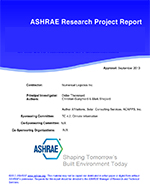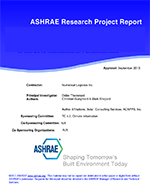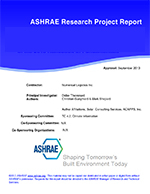-
-
Available Formats
- Options
- Availability
- Priced From ( in USD )
-
Available Formats
-
- Immediate download
- $32.00
- Add to Cart
Customers Who Bought This Also Bought
-

RP-176 -- Energy Loss Due to Friction of Thermal and/Or A...
Priced From $32.00 -

RP-121 -- The Determination of the Specific Heat of Build...
Priced From $32.00 -

RP-123 -- Measurement and Analysis of Partical Size in a ...
Priced From $32.00 -

RP-126 -- A Study to Update Indoor Sound Criteria for Air...
Priced From $32.00
About This Item
Full Description
Thermal comfort is defined as that condition of mind that expresses satisfaction with the thermal environment. Similarly, a thermal sensation is defined as a conscious experience resulting from exposure to a class of variables making up the thermal environment. This project describes two experiments to test thermal comfort.
In some of the experiments subjects are dressed in uniform clothing and enter an environmental chamber whose thermal conditions are systematically varied. In other studies, the subjects increase or decrease one of the environmental constituents (dry bulb temperature) until they feel comfortable.
But regardless of the procedure, neither of these designs examines the environmental antecedents or events and conditions that occur prior to the exposure. Moreover, from what we know about the subtleties of the affective thermal response, it is not at all unlikely that one or more of these factors may effect the subsequent responses of the subjects while in the environmental chamber. Because of this the present study was undertaken with the purpose being to examine the effects of environmental antecedents on comfort. In the first study the effects of earlier exposure to different temperatures were studied, and in the second study the effects of the room decor on comfort was investigated.





